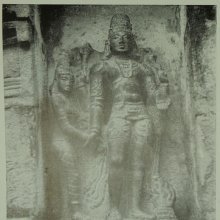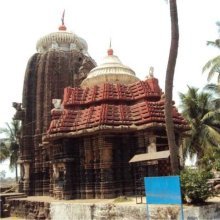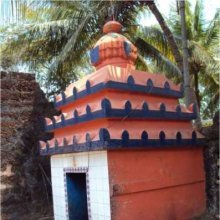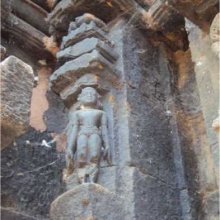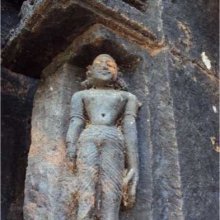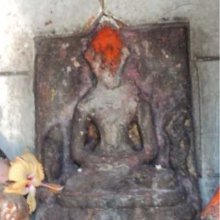Somanatha, Soma-natha, Somanātha: 11 definitions
Introduction:
Somanatha means something in Buddhism, Pali, Hinduism, Sanskrit, Marathi. If you want to know the exact meaning, history, etymology or English translation of this term then check out the descriptions on this page. Add your comment or reference to a book if you want to contribute to this summary article.
Images (photo gallery)
In Hinduism
Kavya (poetry)
Source: Shodhganga: A critical appreciation of soddhalas udayasundarikathaSomanātha (सोमनाथ).—Soḍḍhala has referred to Prabhāsa-kṣetra, on the coast of Kathiawar, where the shrine of Śrī Somanātha had been already established. People worshiped Somanātha for the fulfilment of their desired object. At the time of Soḍḍhala a great number of people went on a pilgrimage of Somanātha. The author refers to the huge crowd of pilgrims gathered together on a sacred day. He also refers that this shrine fulfilled the desires of the devotees.
According to a reference in the Skandapurāṇa the sacred shrine of Somanātha must have been the shrine of Bhairavanātha before it came to be known as Somanātha. Śrī Jote R. B. considers that the worship of Somanātha is connected with the worship of the moon and the fire and also notes that the worshipers of Śiva according to Somavidyā, the special cult of worshipping Śiva along with the moon, were in great numbers at Prabhāsa.

Kavya (काव्य, kavya) refers to Sanskrit poetry, a popular ancient Indian tradition of literature. There have been many Sanskrit poets over the ages, hailing from ancient India and beyond. This topic includes mahakavya, or ‘epic poetry’ and natya, or ‘dramatic poetry’.
Purana and Itihasa (epic history)
Source: archive.org: Shiva Purana - English TranslationSomanātha (सोमनाथ) refers to one of twelve Jyotirliṅgas, according to the Śivapurāṇa 1.22 while explaining the importance of the partaking of the Naivedya of Śiva. Somanātha is located at Somanath Pattan, Gujarat.

The Purana (पुराण, purāṇas) refers to Sanskrit literature preserving ancient India’s vast cultural history, including historical legends, religious ceremonies, various arts and sciences. The eighteen mahapuranas total over 400,000 shlokas (metrical couplets) and date to at least several centuries BCE.
Jyotisha (astronomy and astrology)
Source: Wisdom Library: Brihat Samhita by VarahamihiraSomanātha (सोमनाथ) is associated with Prabhāsa [?], according to the Bṛhatsaṃhitā (chapter 16) (“On the planets—graha-bhaktiyoga”), an encyclopedic Sanskrit work written by Varāhamihira mainly focusing on the science of ancient Indian astronomy astronomy (Jyotiṣa).—Accordingly, “Saturn presides over the countries of Ānarta, Arbuda, Puṣkara, Saurāṣṭra, Abhīra, Śūdra, Raivataka, countries through which the river Sarasvatī passes as an underground stream and the western countries; over the natives of Kurukṣetra, the town of Somanātha [e.g., prabhāsa], and persons born on the banks of the Vidiśā, the Vedasmṛti and the Mahī; over wicked men, uncleanly men and men of the lowest class; over oil-mongers, weak men and persons not possessing virility”.

Jyotisha (ज्योतिष, jyotiṣa or jyotish) refers to ‘astronomy’ or “Vedic astrology” and represents the fifth of the six Vedangas (additional sciences to be studied along with the Vedas). Jyotisha concerns itself with the study and prediction of the movements of celestial bodies, in order to calculate the auspicious time for rituals and ceremonies.
In Buddhism
Theravada (major branch of Buddhism)
Source: Pali Kanon: Pali Proper NamesA park laid out by Parakkamabahu I. Cv.lxxix.10.
Theravāda is a major branch of Buddhism having the the Pali canon (tipitaka) as their canonical literature, which includes the vinaya-pitaka (monastic rules), the sutta-pitaka (Buddhist sermons) and the abhidhamma-pitaka (philosophy and psychology).
Languages of India and abroad
Marathi-English dictionary
Source: DDSA: The Molesworth Marathi and English Dictionarysōmanātha (सोमनाथ).—m (S) One of the lingams of Shiva.
Marathi is an Indo-European language having over 70 million native speakers people in (predominantly) Maharashtra India. Marathi, like many other Indo-Aryan languages, evolved from early forms of Prakrit, which itself is a subset of Sanskrit, one of the most ancient languages of the world.
Sanskrit dictionary
Source: DDSA: The practical Sanskrit-English dictionarySomanātha (सोमनाथ).—
1) Name of a celebrated Liṅga or the place where it was set up; (which by its splendour and enormous wealth attracted the attention of Mahomad of Ghazani who in 124 A.D. destroyed the image and carried of the treasure); तेषां मार्गे परिचयवशादर्जितं गुर्जराणां यः संतापं शिथिलमकरोत् सोमनाथं विलोक्य (teṣāṃ mārge paricayavaśādarjitaṃ gurjarāṇāṃ yaḥ saṃtāpaṃ śithilamakarot somanāthaṃ vilokya) | Vikr.18.87.
Derivable forms: somanāthaḥ (सोमनाथः).
Somanātha is a Sanskrit compound consisting of the terms soma and nātha (नाथ).
Source: Cologne Digital Sanskrit Dictionaries: Shabda-Sagara Sanskrit-English DictionarySomanātha (सोमनाथ).—m.
(-thaḥ) 1. Name of a celebrated Linga destroyed by Mahmud of Gazni. 2. The place where this Linga was set up.
Source: Cologne Digital Sanskrit Dictionaries: Aufrecht Catalogus Catalogorum1) Somanātha (सोमनाथ) as mentioned in Aufrecht’s Catalogus Catalogorum:—father of Mahādeva (Prayogavaijayantī). Oxf. 364^b.
2) Somanātha (सोमनाथ):—Anyoktimuktāvalī. Anyoktiśataka. Śṛṅgāravairāgyamuktāvalī.
3) Somanātha (सोमनाथ):—Guṇaratna [nyāya]
4) Somanātha (सोमनाथ):—Candrikā bṛhatī [grammatical] Chandaḥprakāśaṭīkā. Śiśubodha [grammatical]
5) Somanātha (सोमनाथ):—Jātimālā.
6) Somanātha (सोमनाथ):—Rāgavibodhaviveka. See Soma, son of Mudgala.
7) Somanātha (सोमनाथ):—Rāmāryāśataka. Vairāgyaśataka
8) Somanātha (सोमनाथ):—guru of Rāmakṛṣṇa (Līlāvatīvṛtti).
9) Somanātha (सोमनाथ):—a Bengali Brahman, father of Lālabhaṭṭa, father of Mahādeva, father of Jñāneśvara, father of Gaṇeśa (Tithimañjarī).
10) Somanātha (सोमनाथ):—Bhaktirahasya.
11) Somanātha (सोमनाथ):—son of Maheśa Bhaṭṭa or Maheśvara Bhaṭṭa: Ajñānadhvāntadīpikā.
12) Somanātha (सोमनाथ):—C. on Āpastambaśrautasūtra.
13) Somanātha (सोमनाथ):—Śivāvivāhamaṇḍapa.
Source: Cologne Digital Sanskrit Dictionaries: Monier-Williams Sanskrit-English Dictionary1) Somanātha (सोमनाथ):—[=soma-nātha] [from soma] m. Name of various scholars, [Catalogue(s); Colebrooke]
2) [v.s. ...] n. Name of a celebrated Liṅga of Śiva and of the place where it was set up by the god Soma (in the town described below; it was one of the 12 great Liṅga temples of India held in especial veneration cf. [Indian Wisdom, by Sir M. Monier-Williams 322 n. 1], and was so famed for its splendour and wealth that it attracted the celebrated Mahmūd of Ghaznī, A.D. 1024, who, under pretext of destroying its idols, carried off its treasures along with its renowned gates), [Vikramāṅkadeva-carita, by Bilhaṇa; Vopadeva; Catalogue(s); Colebrooke] etc.
[Sanskrit to German]
Sanskrit, also spelled संस्कृतम् (saṃskṛtam), is an ancient language of India commonly seen as the grandmother of the Indo-European language family (even English!). Closely allied with Prakrit and Pali, Sanskrit is more exhaustive in both grammar and terms and has the most extensive collection of literature in the world, greatly surpassing its sister-languages Greek and Latin.
Kannada-English dictionary
Source: Alar: Kannada-English corpusSōmanātha (ಸೋಮನಾಥ):—[noun] Śiva.
Kannada is a Dravidian language (as opposed to the Indo-European language family) mainly spoken in the southwestern region of India.
See also (Relevant definitions)
Starts with: Somanatha bhatta, Somanatha dikshita, Somanatha mahapatra, Somanatha pandita, Somanathabhashya, Somanathabhatta, Somanathadikshita, Somanathadikshitiya, Somanathamahapatra, Somanathapandita, Somanathapattana, Somanathaprashasti, Somanatharasa, Somanathatirtha.
Ends with: Palkuriki Somanatha, Shrisomanatha.
Full-text (+81): Purvamimamsa, Panditaradhya-caritra, Somanathaprashasti, Somanathadikshitiya, Somanathabhashya, Somanathadikshita, Somanathapandita, Somanathabhatta, Somanathatirtha, Somanathamahapatra, Somanathapattana, Somanatharasa, Saurashtra, Bhaktirahasya, Dhvantadipika, Somanatha pandita, Prabhasa, Prabhasakshetra, Jnanamanjari, Anyoktimuktavali.
Relevant text
Search found 30 books and stories containing Somanatha, Soma-natha, Soma-nātha, Sōma-nātha, Somanātha, Sōmanātha; (plurals include: Somanathas, nathas, nāthas, Somanāthas, Sōmanāthas). You can also click to the full overview containing English textual excerpts. Below are direct links for the most relevant articles:
The Skanda Purana (by G. V. Tagare)
Chapter 48 - The Description of Somanātha < [Section 2 - Kaumārikā-khaṇḍa]
Section 1 - Prabhāsa-kṣetra-māhātmya < [Book 7 - Prabhāsa Khaṇḍa]
Chapter 85 - The Greatness of Somanātha Tīrtha < [Section 3 - Revā-khaṇḍa]
Vastu-shastra (5): Temple Architecture (by D. N. Shukla)
Temples of Gujrat (Gujarat) and the West < [Chapter 12 - History of Hindu Temples (Prāsādas and Vimānas)]
Bhaumika Vimānas (Temples of South India, Decan and Greater India) < [Chapter 12 - History of Hindu Temples (Prāsādas and Vimānas)]
Blue Annals (deb-ther sngon-po) (by George N. Roerich)
Chapter 7 - Kālacakra lineage: Somanātha < [Book 10 - The Kālacakra]
Chapter 8 - The second Kālacakra lineage < [Book 10 - The Kālacakra]
Chapter 13 - Kālacakra in Tibet < [Book 10 - The Kālacakra]
Lakulisha-Pashupata (Philosophy and Practice) (by Geetika Kaw Kher)
Connection between Lakulisa-Pasupatas and Kapalikas < [Chapter 2 - Spread and Transition]
Kalamukhas and Virasaivas: The present day tradition < [Chapter 2 - Spread and Transition]
The Gautami Mahatmya (by G. P. Bhatt)
Later Chola Temples (by S. R. Balasubrahmanyam)
Temples in Achyutamangalam < [Chapter XII - Temples of Kulottunga III’s Time]
Appendix < [Chapter XII - Temples of Kulottunga III’s Time]
